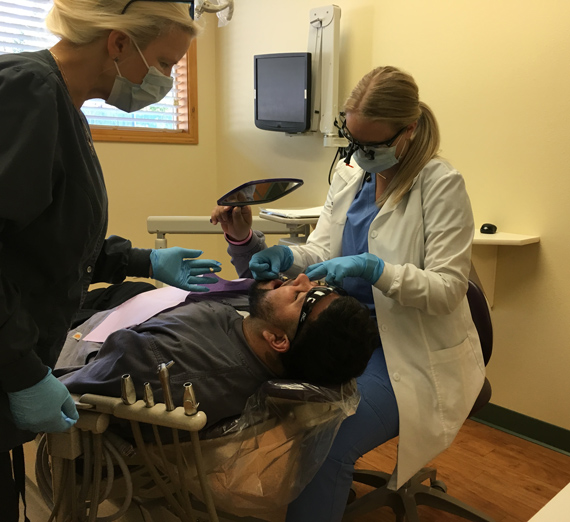RIDE Brings Smiles to Rural and Underserved Communities

An outgrowth of the University of Washington School of Dentistry, RIDE is poised for growth, supporting dental students who wish to live, learn, and work in rural Eastern Washington communities.
Imagine you’ve lost a filling or have a nagging toothache. For many of us, a trip to the dentist is just a few minutes away. But for those who live in rural Eastern Washington, a check-up can involve an hour’s drive, if not more.
“It’s a distribution issue,” said Frank Roberts, professor and associate dean for Regional and Global Affairs and RIDE at the University of Washington School of Dentistry. “Dentists trained in large cities tend to stay there, and dentists retiring in small towns, tribal sites, or community health centers are unable to find buyers for their practices.”
For example, in 2007, King County had six times as many dentists per capita as Pend Oreille County in Washington’s northeast corner.
“We based the program on the WWAMI model,” Roberts said.
WWAMI (Washington, Wyoming, Alaska, Montana, Idaho) is the University of Washington School of Medicine’s regional medical education program that helps supply young physicians to rural and underserved areas in the Northwest.
“When we launched, there were 27 unfilled rural dental positions in Eastern Washington,” said Art DiMarco, EWU RIDE director. “These little communities had no dentists and had to travel for dental care.”
RIDE students spend their first year at the EWU Spokane campus, where they study alongside EWU dental hygiene students and WWAMI medical students and participate in a summer clinical rotation at a rural/underserved RIDE site.
“The Washington State Dental Association and the Spokane District Dental Society have been great supporters,” said Roberts.
During their second and third years, students’ study at the UW in Seattle and then spend the winter and spring of their fourth year at one of several Eastern Washington community health centers. The clinics where the students work see a high proportion of patients who live below the poverty line, are on Medicaid, or have no insurance. A significant number are children.
“Working in these smaller clinics allows them to meet the people, get to know the area, and learn the challenges these communities face,” Roberts explained. “They really enjoy it - they relish returning to these small towns.”
The success of RIDE is in the numbers.
“When we started, only 3% to 4% of dental school graduates were going into rural communities,” DiMarco said. “Today 81% of RIDE graduates choose to practice in rural/underserved areas.”
Gerardo Aragon is one of those graduates. He grew up in Quincy and works for Moses Lake Community Health Center at its Ephrata location.
“My parents were migrant farm workers from Mexico,” he said. “Growing up, I worked in agriculture, but I always wanted to go into dentistry. I saw the impact the lack of resources and education had on dental care. It’s also a cultural thing. We don’t seek help until things are really bad.”
Aragon, a 2021 graduate, worked at the Moses Lake Community Health Center in Quincy during his second-year summer rotation and then returned during his fourth year.
“Being able to provide preventive health education and treatment to people I identified with brought me back home,” Aragon said. “I knew I wanted to come back to my hometown. I’ve always wanted to give back to my community. Because of my connection, we’ve had more people than ever before come to the Ephrata clinic."
Robert Rosenthal, RIDE class of 2021, became acquainted with small towns when he worked as a wildland firefighter (hotshot) and smoke jumper for several years during college.
“During my six seasons, I went to all nine smoke jumping bases and the last one was in Winthrop, Wash.”
Rosenthal comes from a family of dentists, and that exposure to small-town life led him to join the RIDE program. After graduating, he opened a practice in tiny Twisp, Wash.
“I’m the only practice here,” he said. “The training I received through RIDE let me hit the ground running.”

He recently hired fellow RIDE graduate Katarina Behla but said the need for more providers is pressing. Though the town itself is small, Rosenthal provides care for the surrounding area.
“I’m the only practice for 6,000 patients,” he said. “How do we take care of all these people? That’s what we’re struggling with.”
The answer may be on the way.
“We have more applicants than UW can take,” Roberts said. “We’d like to double the class size and expand into Western Washington.”
To facilitate more students, they need more space.
“We are limited to eight students per class because we don’t have room in our current facility for more,” explained DiMarco.
“Currently, students are in three locations. We want to bring them all together and for our students to be able to stay in Spokane for their second year,” said Roberts.
That would delight students.
“They want to remain in Spokane,” DiMarco said. “They love the interaction with faculty and smaller class sizes.”
RIDE leaders envision Spokane becoming a regional dental education hub with newly minted dentists working throughout the state and potentially across the WWAMI region.
“There is still such a large need for dentists in rural and underserved communities,” said DiMarco.
